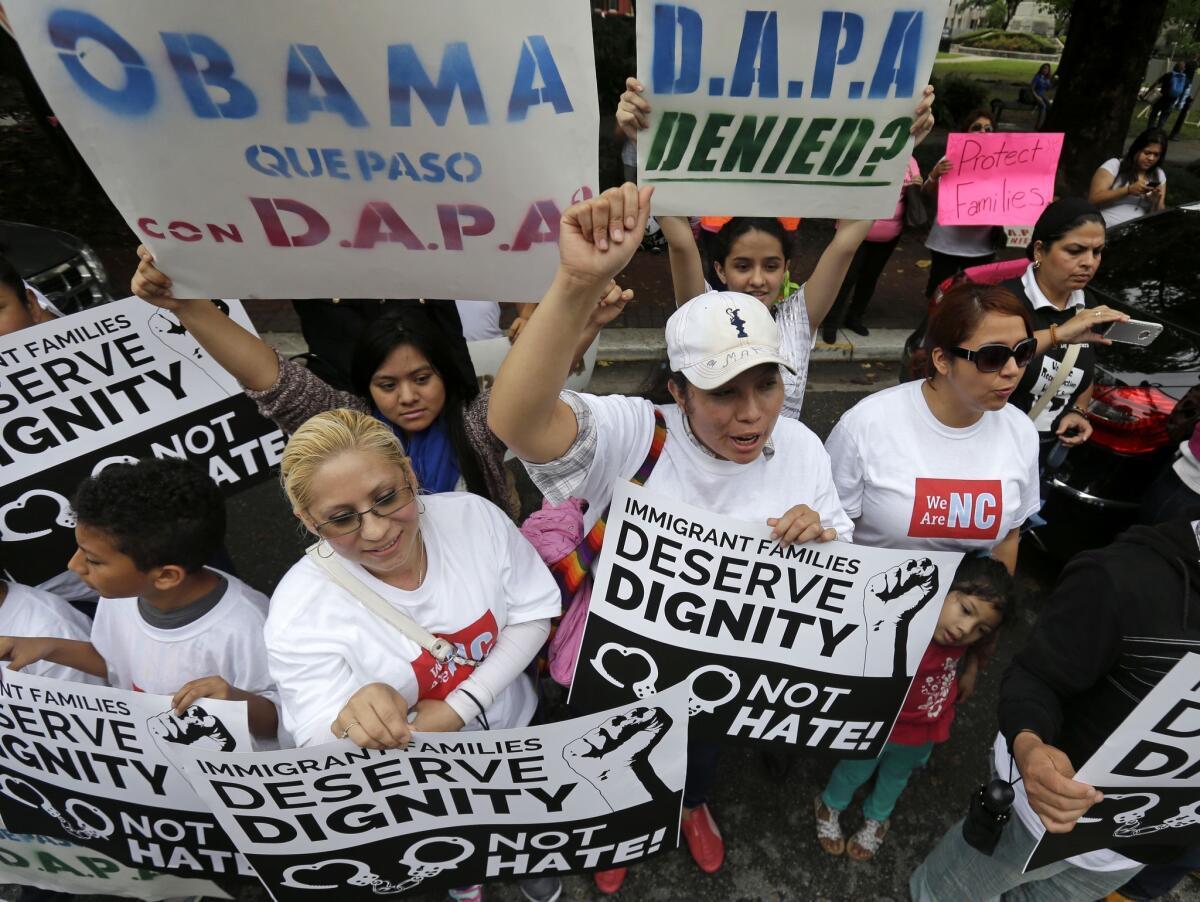Obama administration will ask Supreme Court to protect millions from deportation

Demonstrators participate in an April 17 rally outside the U.S. 5th Circuit Court of Appeals in New Orleans after a three-judge panel heard arguments on President Obama’s executive action seeking to shield millions of immigrants from deportation.
- Share via
Reporting from Washington — The Obama administration said Tuesday it will ask the Supreme Court to reverse a lower court ruling and to back White House efforts to shield more than 4 million immigrants from deportation.
The Justice Department will file an appeal seeking to overturn Monday’s 2-1 ruling by the 5th Circuit Court of Appeals. That decision said Obama had exceeded his authority when he created programs that allowed some immigrants in the country illegally to stay and obtain work permits.
Even if the Supreme Court agrees to hear the high-profile case, they may not rule before Obama leaves office in January 2017. Immigration thus is almost certain to remain a politically contentious issue in the 2016 presidential campaign.
Many Republican candidates have vowed to undo Obama’s immigration orders if they win next November. Democrats have vowed to expand those orders in an appeal to Latinos and others who support easing enforcement of immigration law.
Josh Earnest, the White House spokesman, said the administration will not change its deportation priorities following the court ruling, thus limiting the immediate impact.
With the programs already stalled by the legal battle, he said immigration officials will continue to first deport foreigners with criminal records, those with multiple immigration violations and recent border crossers, not those who applied for work permits.
“The enforcement priorities will remain in place, primarily because it’s just common sense,” Earnest said.
Republican lawmakers hailed the ruling for its rejection of executive power.
“The president simply can’t singly rewrite the country’s immigration laws,” said Sen. Charles E. Grassley (R-Iowa), chairman of the Senate Judiciary Committee. He called the ruling a win for checks and balances established in the Constitution.
The appeals court ruling mostly stops a program called Deferred Action for Parents of Americans, or DAPA, which was intended to help foreign-born parents of U.S. citizens or permanent residents.
Scheduled to start in May, it would grant three-year work permits and temporary protection from deportation to up to 4.3 million adults who have lived in the United States illegally for at least five years.
The court ruling does not affect more than 600,000 other immigrants who already have been granted work permits under a separate program that was created in 2012.
The Deferred Action for Childhood Arrivals program, known as DACA, was aimed at protecting people in the country illegally who had come as children.
The next president could refuse to renew those work permits, making the survival of DACA a likely litmus test for Republican candidates.
A tough stance against expanding visa opportunities and creating a path to legal status plays well with voters in many Republican House districts and in the party’s presidential primaries.
But establishment Republicans fear a hardline stance in the primaries could undermine GOP efforts to woo enough Latinos to win the White House. It also could hamper GOP candidates in future races as the nation’s growing Latino population assumes a larger portion of the electorate each year.
Donald Trump’s early call to deport the estimated 11 million people in the country illegally helped his seeming long-shot campaign soar to the top of the polls.
That, in turn, largely silenced Republicans who had called for creating a pathway to citizenship and for easing other laws to fill farming and factory jobs and to boost hiring of foreigners for the high-tech sector.
Both Sen. Marco Rubio and former Gov. Jeb Bush, both from Florida, have tamped down earlier positions seen as more sympathetic to immigrant families, though neither candidate is making a major campaign push on the issue.
The leading Democratic candidates argued that Obama’s executive actions weren’t sweeping enough.
The front-runner, Hillary Rodham Clinton, is bound to face questions about how she can fulfill her pledge to expand Obama’s immigration orders now that a federal court has ruled against them.
In a statement Tuesday, she said she strongly disagreed with the 5th Circuit ruling in what she called “this politically motivated lawsuit.”
“The legal authority supporting the president’s actions is well established,” she said.
Her chief rival, Sen. Bernie Sanders (I-VT) praised Obama for deciding to appeal the lower court ruling.
“American immigration policy should be about united families, not separating families,” he said in a statement.
Some Democrats and immigration advocates, while disappointed with the court ruling, appeared to welcome a drawn-out public battle in the midst of a presidential campaign.
“We cannot control the courts, but we will have a say in political outcomes,” Ben Monterroso, executive director of Mi Familia Vota, a Latino political advocacy organization, said in a statement.
“It is now up to us -- Latino voters and groups like ours that are working every day to grow our vote in the 2016 national election -- to elect candidates who respect our communities and will commit to working on our issues and treating us fairly,” he said.
Once the Justice Department files its appeal with the Supreme Court, Texas will have 30 days to respond. The justices then would add the appeal to a list of cases to be considered.
Unless they decide by mid-January to hear the appeal, it would not be argued and decided in the term that ends next summer. Cases taken up in February or later won’t be decided until after Obama leaves office in January 2017.
Bill Hammond, a former Republican state lawmaker now serving as CEO of the Texas Assn. of Business, said Obama’s executive action last year and the ensuing legal battle eroded any chance of Republican support for comprehensive immigration reform while he remains in office.
“The president’s action was actually a hindrance in getting that done,” Hammond said. “The more important goal is to fix the immigration system way beyond just dealing with those already here. What we have today is de facto amnesty.”
A bipartisan majority in the Senate narrowly passed a comprehensive immigration reform bill in 2013 but the GOP-led House refused to consider it. Obama acted months after the bill had died in Congress.
Los Angeles Times staff writers Lisa Mascaro, Christi Parsons, David G. Savage, Timothy M. Phelps in Washington and Molly Hennessy-Fiske in Houston contributed to this report.
ALSO:
In Republican debate, moderators will be in the spotlight
Starbucks cups have some evangelical Christians seeing red
Why are 10% of prisoners on death row veterans, some with PTSD?
More to Read
Sign up for Essential California
The most important California stories and recommendations in your inbox every morning.
You may occasionally receive promotional content from the Los Angeles Times.











